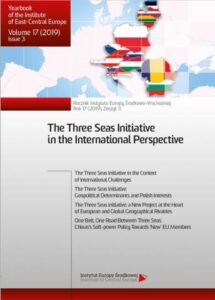ORCID: Martin Dahl: 0000-0003-1978-7045
Pages: 65-77
Edition: Lublin 2019
DOI: https://dx.doi.org/10.36874/RIESW.2019.3.4
Citation method: M. Dahl, Evolution of Germany’s Stance Regarding the Three Seas Initiative, „Rocznik Instytutu Europy Środkowo-Wschodniej” 17 (2019), z. 3, s. 65-77, DOI: 10.36874/RIESW.2019.3.4.
Keywords: geopolitics, German Foreign Policy, Polish Foreign Policy, Three Seas Initiative
Abstract:
When the political camp centred on the Law and Justice party (PiS) came to power in 2015, it led to a change in priorities in Polish foreign policy. The Three Seas Initiative (TSI), understood as closer cooperation between eastern states of the European Union in the area between the Baltic, Adriatic, and Black seas, has become a new instrument of foreign policy. The initiative demonstrates the growing importance of Central and Eastern Europe in the global game of great powers. The region has become a subject of rivalry, not only between the United States and Russia but also China. Therefore, the main objective of this article is to try to describe the importance of the region to Germany and how Germany’s stance on the TSI has evolved. The article consists of three parts, an introduction to the issues, the genesis of the TSI, and the definition of goals set by the states participating in this initiative, as well as analysis of the German stance towards the initiative since its development in 2015. The theories of geopolitics and neorealism are used as the theoretical basis for the analysis.
Bibliography:
Andrychowicz-Skrzeba J., Reicht R., ‘Goodbye Europe? Die Außenpolitik der polnischen PiS-Regierung’, Internationale Politikanalyse, Friedrich Ebert Stiftung, June 2016.
Bundesministerium für Wirtschaft und Energie, ‘Russische Föderation – Wirtschaftliche Beziehungen’, Artikel, https://www.bmwi.de/Redaktion/ DE/Artikel/Aussenwirtschaft/laendervermerk-russische-foerderation. html [2019-07-21].
Chojan A., ‘Grupa Wyszehradzka w polityce zagranicznej Polski – między współpracą a rywalizacją’, Biuletyn Analiz i Opinii ZE ISPPAN, no. 4, 2016.
Czaputowicz J., Teorie stosunków międzynarodowych. Krytyka i systematyzacja, Warsaw: Wydawnictwo Naukowe PWN, 2008.
Fischer J., Der Abstieg des Westens, Köln: Verlag Kiepenheuer & Witsch, 2018.
Fiszer J.M., ‘Bezpieczeństwo międzynarodowe w multipolarnym ładzie globalnym ze szczególnym uwzględnieniem roli Rosji’,Myśl Ekonomiczna i Polityczna, no. 4, 2013.
Fiszer J.M., ‘System euroatlantycki i bezpieczeństwo międzynarodowe w multipolarnym świecie’, Myśl Ekonomiczna i Polityczna, no. 2, 2013.
Gniazdowski M., ‘Trójmorze – nowy instrument w polskiej polityce zagranicznej’, Polski Przegląd Dyplomatyczny, no. 4, 2017.
Grzymski J., ‘Granice Europy w wyobrażeniach i praktykach Europejskiej Polityki Sąsiedztwa i Partnerstwa Wschodniego’, Przegląd Europejski, no. 3, 2017.
Hasselbach Ch., Romaniec R., ‘Drei-Meere-Initiative Putin, Trump und Ximischen mit: Der Osten der EU wird zum Brennpunkt der Großmächte’, Focus online, 5 June 2019, https://www.focus.de/politik/ausland/drei- meere-initiative-berlin-wertet-drei-meere-initiative-auf_id_10795403. html [2019-07-22].
Janulewicz Ł., Żornaczuk T., ‘Germany and the Three Seas Initiative’, Bulle- tin of The Polish Institute of International Affairs, no. 120 (1366), 22 Au- gust 2019, http://www.pism.pl/upload/files/Bulletin%20PISM%20no%20 120%20(1366)%2022%20August%202019(1).pdf [2019-10-11].
Kędzierski M., ‘Śpieszmy się kochać Niemców. W przededniu europejsk- iego kryzysu’, Klub Jagielloński, 14 January 2018, http://jagiellonski24. pl/2018/01/14/spieszmy-sie-kochac-niemcow-w-przededniu-europejsk- iego-kryzysu/ [2019-07-21].
Kopeć R., Mazur P., Odstraszanie militarne w XXI wieku. Polska – NATO – Rosja Cracow: Uniwersytet Pedagogiczny im. KEN, 2017.
Lepiarz J., ‘Grupa Wyszehradzka największym partnerem handlowym Niemiec’, Gazeta Prawna, 24 October 2017, http://www.gazetapraw- na.pl/artykuly/1080413,faz-grupa-wyszehradzka-najwiekszym-part- nerem-handlowym-niemiec.html [2019-07-21].
Naumann F., Mitteleuropa, Berlin: Reimer, 1915.
Popławski K., ‘Rola Europy Środkowej w gospodarce Niemiec. Konsekwencje polityczne’, Raport OSW, no. 05, 2016.
President of Poland, ‘Minister Szczerski: Inicjatywa Trójmorza to nowy pomysł na zwiększanie jedności europejskiej’, Chancellery, 4 May 2017, http:// www.prezydent.pl/kancelaria/aktywnosc-ministrow/art,683,minister-szc- zerski-inicjatywa-trojmorza-to-nowy-pomysl-na-zwiekszanie-jednosci- europejskiej-.html [2019-07-17].
President of Poland, ‘Orędzie Prezydenta RP Andrzeja Dudy przed Zgro- madzeniem Narodowym z dnia 6 sierpnia 2015 roku’, News, 6 August 2015, http://www.prezydent.pl/aktualnosci/wypowiedzi-prezydenta-rp/wys- tapienia/art,1,oredzie-prezydenta-rp-andrzeja-dudy-przed-zgromadzeni- em-narodowym.html [2019-07-17].
President of Poland, Wspólna deklaracja w sprawie Inicjatywy Trójmorza, 25.08.2016, News, 25 August 2016, http://www.prezydent.pl/aktualnosci/ wizyty-zagraniczne/art,105,wspolna-deklaracja-w-sprawie-inicjatywy- trojmorza.html [2019-07-18].
Sienkiewicz M., ‘Koncepcja Trójmorza w polityce zagranicznej Polski po 2015 r.’, Dyplomacja i Bezpieczeństwo, no. 1 (4), 2016.
Soroka G., ‘Was Polen in der Drei-Meere-Initiative sieht’, ZOiS Spotlight, no. 28, 2019, https://www.zois-berlin.de/publikationen/zois-spotlight/was- polen-in-der-drei-meere-initiative-sieht/ [2019-07-21].
Steinmeier F.-W., Europa ist die Lösung. Churchills Vermächtnis, Wals bei Salzburg: Ecowin Verlag, 2016.
Stępniewski T., ‘Partnerstwo Wschodnie Unii Europejskiej w dobie wstrząsów i przemian Europy Wschodniej’, Studia Europejskie, no. 3, 2017.
‘The Road Ahead – CEE Transport Infrastructure Dynamics’, Joint Atlantic Council – PwC Report, 2017.
Ukielski P., ‘Inicjatywa Trójmorza w polskiej polityce zagranicznej’, Studia Europejskie, no. 2, 2018.
Verosta S., The German Concept of Mitteleuropa, 1914-1918 and its Contem- porary Critics, in: R.A. Kann, B.A. Király, P.S. Fichtner (eds), The Habs- burg Empire in World War I. Essays on the Intellectual, Military, Political and Economic Aspects of the Habsburg War Effort, New York: Columbia University Press, 1977.
Więcławski J., ‘Contemporary Realism and the Foreign Policy of the Russian Federation’, International Journal of Business and Social Science, vol. 2, 2011. Więcławski J., ‘Hans Morgenthau, realizm klasyczny i jego rekomendacje dla polskiejpolitykizagranicznej’,MyślEkonomicznaiPolityczna,vol.3,2011.

PDF: Download